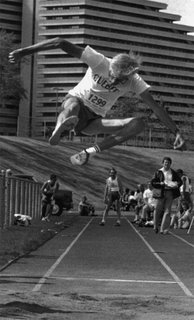 My grandfather Ian Hume has died at the age of 91. He is pictured above, leaping, Montreal's Olympic Village in the background.
My grandfather Ian Hume has died at the age of 91. He is pictured above, leaping, Montreal's Olympic Village in the background.He was one of my heroes, an extraordinary man. When I would say I was his grandson, people would nod, as if I had said Atticus Finch was. People who met him called him "Mr. Hume" - men in their 60s like schoolboys at his name - to meet him was to never forget him, for he was good, and he inspired you to be your best, in any walk of life.
In a poll for a news magazine, he was once voted one of the "100 best things about Canada" - up there near Niagara Falls.
Ian Hume was synonymous in Canada with excellence, on and off the track. He was the chief official for Track & Field at the Montreal Olympics in 1976. He was a key member of Olympic committees that wrote the rules for woman's pentathlon and other events. He was given the Order of Canada for his achievements, and has had a major track meet named after him.
More than that, he was Canada's most fit man, who competed internationally into his early 80s, and held global records in many events; his medal room was floor to ceiling brimming with thousands of golds, silvers and a few bronzes. He was a TV figure in Japan, where his monumental height (six-foot-eight) made him striking. He skied through his woods each day in winter, clearing away the dead branches; in spring he made maple syrup with a team of horses and buckets, the old way; in summer he worked his fields; in the autumn, harvested. This until a few years ago.
He had grown up in a small Quebec village in the predominantly English Eastern Townships, his father a run-away from a wealthy Anglo-Irish family; became teacher of the one-room schoolhouse he began a pupil in; walked miles each way in woods to school with his pet crow; became an athlete by jumping and leaping over bales of hay in fields; graduated young from Bishops University, with the medal for best French speaker in the province, and began teaching at high school, for many years in St-Lambert. Meanwhile, he joined the police of Montreal, and became their star competitor at the Police Games.
Over many years, Ian Hume became one of the best-loved, most-honoured track athletes, then track coaches, in Canadian history - as president of the Canadian Track and Field association. During this time he coached and mentored many thousands of men and women. He got many lost young people off the streets and in to sport. He never had a mean or dishonest thing to say about anyone, ever.
His honesty was as striking as his handsome, gaunt Beckett-features. He recalled everyone he ever met. And would ask after someone 40 years later. Austere, he only smiled to recollect a track record, an old friend, or at the sight of a bird or other animal in his woods. But he chuckled quietly, enjoying wordplay and a good Robert Frost poem.
He woke at dawn (up and at em!). He never smoked. He never drank - sipped wine at Christmas, a few times. He preferred water. He avoided churches, all false pieties. He had anger only for poor organizers and officials, time wasters, cheats and those that wish to harm or impede others, or themselves. He met nonsense with a stern come off the roof! or come on now!
He was neither a lender nor a borrower - whatever he bought his entire life was with hard-earned cash. His popularity and total integrity would have made him a great Canadian prime minister. He declined all political office, all offers of wealth or self-promotion, declaring all politicians equally dishonest.
Throughout his life of travels to Pan-Am, Commonwealth, Olympic and other games, his beautiful, wife Melita accompanied him. Now she is left to go on. They had four daughters and a son; one is my mother.
Everything I learned about how to compete, how to be honest, how to organize international events, how global co-operation is best, and how young people can be inspired by achieving excellence, I learned from this great, gentle, wise, and very modest man. I regret I have never learned his modesty.
Above all, my grampa loved nature - the woods and fields of Quebec. He will be buried among them this Friday.
I am told not to mourn, for he lived a good life, and had a long one. Yet I mourn for Canada, and for who we once were. One of Canada's greatest citizens is dead; some part of our greatness has died as well.
Comments
Yes, there are a rare number of people like that. They survive without lending or borrowing, and never saying anything mean about anyone...that is quite remarkable...most of us would like to be more like that but can't. My greatest condolences on your loss, Todd.
I lost my own grandfather (on my mother's side) four years ago, but I wasn't so close to him as you were to yours. Thank you for your eloquent description. No wonder you haven't been blogging recently!